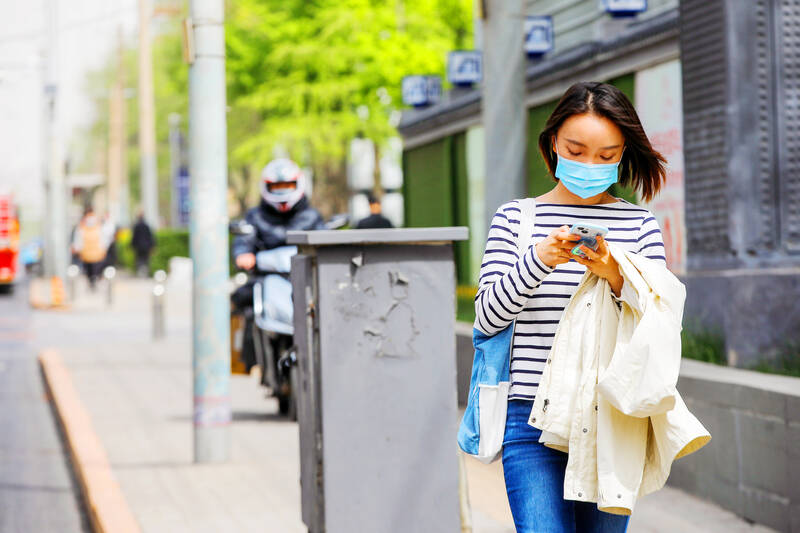China lifted mask mandates for public transport, workplaces and schools, some of the few places where the coverings were still required, doing away with some of its final remaining “zero COVID-19” restrictions as it moves on from the pandemic.
Masks would still need to be worn in hospitals, nursing homes and in the midst of COVID-19 outbreaks, a government statement said on Wednesday.
However, people would be able to take them off on transport, including planes, trains, subways and buses, while people working in offices and students at schools would not be required to wear them either.

Photo: EPA-EFE
China abruptly pivoted from its strict COVID-19 policy in December last year and has largely since returned to normal, with its streets bustling and people eating out, traveling and shopping again after years of on-and-off lockdowns and uncertainty.
However, the reopening also saw a major surge in cases and deaths across the country, fueled in part by inadequate vaccination, which has made some people wary of removing their masks in public even as measures have eased.
The end of masking on transport comes as Chinese authorities approve new immunizations including its first homegrown shot based on the messenger RNA technology, recommending a fresh immunization as soon as three months after a previous dose or COVID-19 infection — compared with the six-month interval mandated previously.
In related news, Singapore is experiencing a surge in COVID-19 infections as the city-state transitions to living with an endemic virus.
The number of weekly infections so far this year peaked in the final week of last month at more than 28,000 cases, data from the Singaporean Ministry of Health showed.
That is almost double the previous week’s figure of 14,467.
The current wave is driven by a mix of XBB subvariants and the cases are mostly mild, local media reported, citing the health ministry.
Singapore continues to expect new COVID-19 infection waves from time to time, similar to other endemic respiratory diseases such as influenza, local media said.
Singapore dropped most mask mandates in February, citing significantly reduced threats from the virus.

‘UNUSUAL EVENT’: The Australian defense minister said that the Chinese navy task group was entitled to be where it was, but Australia would be watching it closely The Australian and New Zealand militaries were monitoring three Chinese warships moving unusually far south along Australia’s east coast on an unknown mission, officials said yesterday. The Australian government a week ago said that the warships had traveled through Southeast Asia and the Coral Sea, and were approaching northeast Australia. Australian Minister for Defence Richard Marles yesterday said that the Chinese ships — the Hengyang naval frigate, the Zunyi cruiser and the Weishanhu replenishment vessel — were “off the east coast of Australia.” Defense officials did not respond to a request for comment on a Financial Times report that the task group from

Asian perspectives of the US have shifted from a country once perceived as a force of “moral legitimacy” to something akin to “a landlord seeking rent,” Singaporean Minister for Defence Ng Eng Hen (黃永宏) said on the sidelines of an international security meeting. Ng said in a round-table discussion at the Munich Security Conference in Germany that assumptions undertaken in the years after the end of World War II have fundamentally changed. One example is that from the time of former US president John F. Kennedy’s inaugural address more than 60 years ago, the image of the US was of a country

DEFENSE UPHEAVAL: Trump was also to remove the first woman to lead a military service, as well as the judge advocates general for the army, navy and air force US President Donald Trump on Friday fired the chairman of the Joint Chiefs of Staff, Air Force General C.Q. Brown, and pushed out five other admirals and generals in an unprecedented shake-up of US military leadership. Trump wrote in a post on Truth Social that he would nominate former lieutenant general Dan “Razin” Caine to succeed Brown, breaking with tradition by pulling someone out of retirement for the first time to become the top military officer. The president would also replace the head of the US Navy, a position held by Admiral Lisa Franchetti, the first woman to lead a military service,

BLIND COST CUTTING: A DOGE push to lay off 2,000 energy department workers resulted in hundreds of staff at a nuclear security agency being fired — then ‘unfired’ US President Donald Trump’s administration has halted the firings of hundreds of federal employees who were tasked with working on the nation’s nuclear weapons programs, in an about-face that has left workers confused and experts cautioning that the Department of Government Efficiency’s (DOGE’s) blind cost cutting would put communities at risk. Three US officials who spoke to The Associated Press said up to 350 employees at the National Nuclear Security Administration (NNSA) were abruptly laid off late on Thursday, with some losing access to e-mail before they’d learned they were fired, only to try to enter their offices on Friday morning